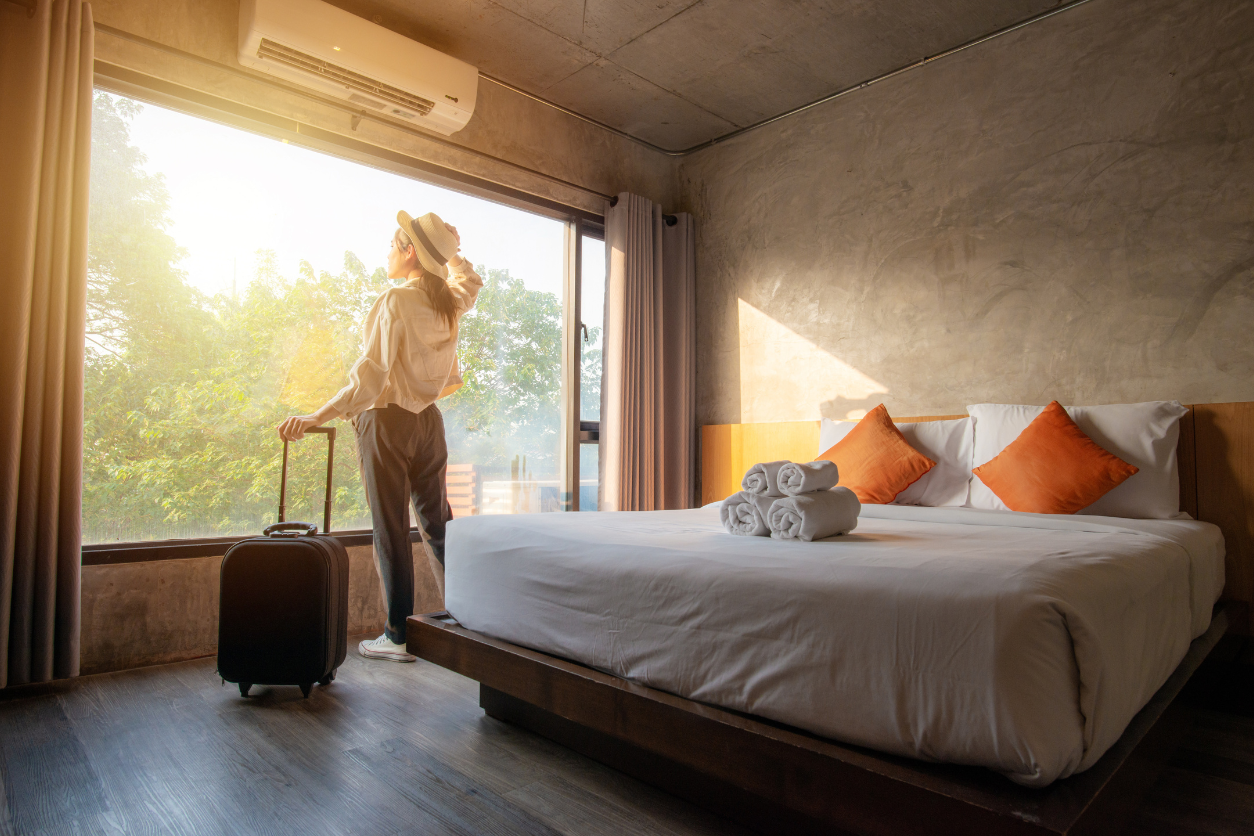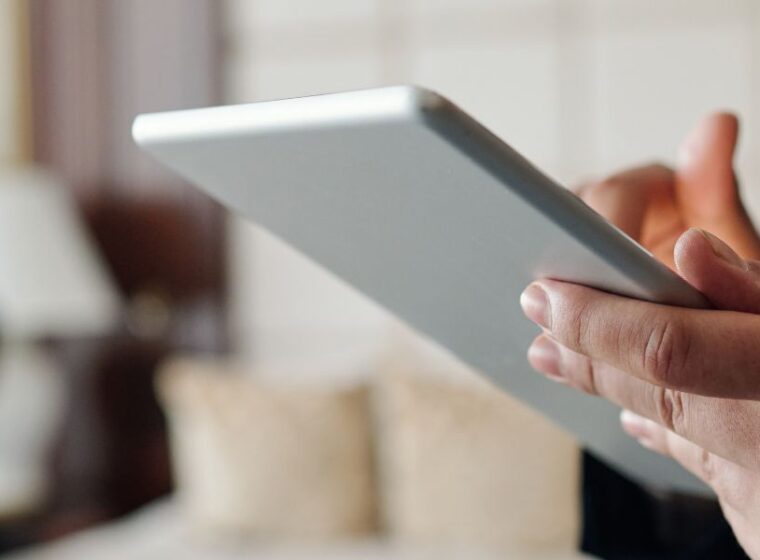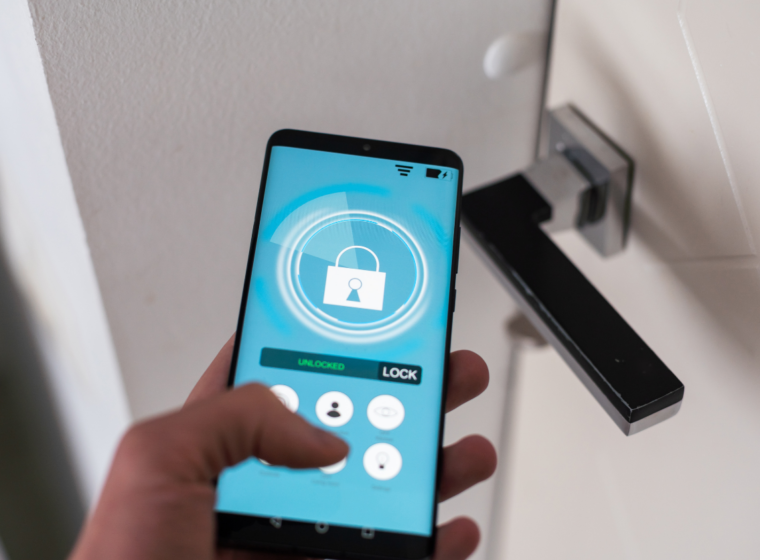Hotel guest room technology has advanced dramatically in recent years, revolutionizing the hospitality sector and transforming what it means to offer remarkable stays. Today, hotels now have access to an array of automated, AI-driven, and mobile technologies that can improve guest experiences while streamlining their operations.
From smart thermostats that optimize temperature control to keyless entry systems that simplify check-in processes, these cutting-edge guest room technology solutions are designed not only to meet but exceed guest expectations.
1. Smart Thermostats
Smart thermostats offer hotel visitors the advantage of automated temperature regulation, enabling them to set the room temp according to their own individual comfort levels. With smart thermostats, guests can easily set their preferred temperatures using an app or voice commands, ensuring a comfortable stay throughout their visit.
These devices not only enhance guest room comfort on an individual basis but also contribute to energy efficiency and cost savings across the entire hotel. The American Council for an Energy-Efficient Economy reports potential savings of HVAC-connected smart thermostats at up to 10%. By learning from guest behaviors and adjusting accordingly, these devices optimize heating and cooling systems while minimizing wasted energy.
Additionally, an integrated back-end solution allows hoteliers to monitor and manage multiple rooms’ climate settings remotely. This enables quick responses when addressing any issues related to guest comfort or system malfunctions.
To successfully implement smart thermostats into your hotel’s technology suite, it is essential to have a reliable WiFi network that can support these IoT-driven devices — such as the responsive hotel room WiFi solutions offered by Blueprint RF.
2. Smart Lighting
Smart lighting technology is transforming the way visitors experience their stay in hotels, offering them the opportunity to quickly and easily tailor the atmosphere of their room. These advanced lighting solutions not only contribute to guest preferences but also help hotels save energy and reduce costs.
With certain smart lighting systems, guests can adjust brightness levels, color temperatures, and even create pre-set scenes based on their preferences or mood. By providing personalized lighting options, hotels can offer guests a customizable ambiance that makes each visitor feel more at home while also helping to conserve energy.
In addition to enhancing guest comfort, smart lighting systems offer eco-friendly benefits as well. Many of these systems come equipped with motion sensors that automatically turn off lights when a room is unoccupied or during daylight hours when natural light is sufficient. This helps hotels conserve energy while still meeting guest expectations for sustainability initiatives.
To provide a truly seamless experience, many smart lighting solutions can be integrated into other guest-facing technologies such as mobile apps or voice-controlled devices like Amazon Echo or Google Home. By offering an integrated back-end solution, hotels can encourage guests to take full advantage of the available technology and further enhance their stay.

3. Keyless Entry
Hospitality is constantly evolving to meet guest expectations, and one area where this is particularly evident is in the adoption of keyless entry systems. These innovative solutions not only provide a more secure method for accessing hotel rooms but also streamline the check-in and check-out processes, ultimately enhancing the overall guest experience.
Keyless entry systems utilize smartphone technology to grant guests access to their rooms without requiring physical keys or cards. Guests simply download an app onto their mobile device, which then communicates with a compatible lock on the hotel room door via Bluetooth or WiFi. This allows them to unlock their room by holding their phone near the door’s sensor. The benefits are multifold, including:
- Increased Security: By eliminating traditional keys or cards that can be lost or stolen, keyless entry provides a higher level of security for both hotels and guests.
- Faster Check-In: With keyless entry systems in place, hotels can offer expedited check-in options through mobile apps – allowing guests to bypass long lines at reception desks upon arrival.
- Easier Room Management: Hotel staff can easily manage access permissions for each guest using an integrated back-end solution, making it simple to accommodate last-minute changes such as room upgrades or extended stays.
To ensure the seamless operation of these advanced systems while maintaining optimal levels of guest satisfaction and comfort, it’s crucial that hotels invest in reliable connectivity solutions in place. Again, these technologies rely on having a strong WiFi network that will support keyless entry functionality all while encouraging guests to utilize other guest-facing solutions.
4. AI-Regulated Maintenance
In order to offer the finest experience for their visitors, hotels must ensure that guest rooms are kept in ideal condition. One way to achieve this is by implementing AI-regulated maintenance systems. Leveraging artificial intelligence, these innovative solutions can help detect potential issues before they become major problems and ensure that hotel rooms are always ready for guests.
AI-integrated sensor technology can help monitor various components of a room’s infrastructure, such as plumbing, electricity, and HVAC units. By analyzing data from these sensors, AI algorithms can identify patterns that may indicate an issue or predict when a component might fail. This proactive approach allows hotel staff to address problems early on and minimize any inconvenience to guests.
In addition to detecting potential issues, AI-regulated maintenance systems can also optimize resource allocation by prioritizing tasks based on urgency and available resources. For example, if multiple rooms require attention at the same time but only limited staff members are available, the system could prioritize tasks that have the most significant impact on guest satisfaction.
Maintaining well-functioning guest rooms not only ensures comfort but also contributes significantly to overall guest satisfaction. Managed network solutions help support the integration with AI-regulated maintenance systems while providing reliable connectivity for other essential technologies like smart thermostats and keyless entry. By investing in these advanced solutions, hotels can enhance the guest experience and build a reputation for exceptional service.
5. Voice-Controlled Utilities
Voice-controlled utilities are becoming increasingly popular technology in hotel rooms, providing a convenient and seamless experience for guests. By simply speaking commands into a device or app, guests can control various aspects of their room such as lights, curtains, air conditioning, and more.
One major advantage of voice-controlled utilities is the hands-free experience they offer to hotel guests. This allows them to easily adjust settings without having to physically interact with switches or remote controls. For example, Marriott Hotels has started testing Amazon’s Alexa and Apple’s Siri in some of their properties.
Voice-controlled utilities often work with other smart devices in the room, creating an interconnected ecosystem that enhances the overall guest experience. For instance, hotels can implement smart speakers, which not only allow voice control but also provide access to music streaming services and virtual assistants.
But even more importantly, voice-controlled utilities improve accessibility for all guests, such as:
- Elderly: Voice-control technology provides better accessibility options for elderly guests who may struggle with small buttons on traditional remotes or light switches.
- Mobility Impaired: Those with mobility impairments will appreciate being able to control their environment without needing assistance from others.
- Visually Impaired: Guests with visual impairments can benefit from voice-controlled utilities as they no longer need to rely on touch or sight to operate devices in their room.
Utilizing voice-activated utilities can be a great benefit to visitors, providing them with the ability to take advantage of amenities and services without having to communicate directly with hotel personnel.

6. Streaming to Mobile Guest Devices
In today’s digitally connected world, hotel guests expect seamless access to their favorite content on their personal devices. As a result, hotels are increasingly investing in guest room technology that enables streaming to their mobile devices. This not only enhances the suite of entertainment capabilities for guests but also helps hotels stay competitive and relevant.
By offering streaming capabilities with TV casting and other solutions, hotels can provide guests with a personalized entertainment experience tailored to their preferences. Guests can link their gadgets to the hotel’s WiFi and stream media from services such as Netflix, Hulu, or Spotify onto the TV or audio system in their room.
The benefits of enabling streaming to mobile guest devices trickle down to hoteliers as well, including:
- Reduced Costs: By allowing guests to use their own subscriptions for streaming services, hotels can save on costly cable packages and licensing fees associated with traditional in-room entertainment systems.
- Improved Guest Satisfaction: Providing easy access to familiar streaming options ensures that guests feel at home during their stay and are more likely to leave positive reviews online.
- Data Insights: Hotels can gain valuable insights into guest preferences by analyzing usage data from these streaming services which can help inform future marketing strategies and improve overall service offerings.
Streaming to mobile guest devices is an important part of providing a modern and convenient hospitality experience, allowing guests to access their favorite content on the go.
7. Room Service Apps
In today’s fast-paced world, hotel guests expect convenience and efficiency at their fingertips. Additionally, in light of recent global events, contactless services have become increasingly important for guest safety. Room service apps are revolutionizing the way hotels cater to their guests’ needs by providing a seamless, personalized, and contactless experience.
Personalization is key in modern hospitality, and room service apps allow guests to customize their orders with ease. From dietary preferences to specific delivery times, these applications enable users to tailor their dining experiences according to individual requirements.
Gone are the days of flipping through printed menus or waiting on hold for an available staff member; room service apps streamline the ordering process with user-friendly interfaces that display real-time menu updates, pricing information, and estimated wait times. This not only saves time but also reduces errors in communication between guests and hotel staff.
Many room service apps also now offer contactless delivery options. These allow food items to be dropped off outside guest rooms without direct interaction between hotel employees and patrons.
Capitalizing on Hotel Room Technology Trends
Incorporating smart technology into hotel guest rooms can enhance the overall guest experience and improve guest comfort while streamlining various processes for hotel staff. From automated temperature control and keyless entry to voice-controlled utilities and room service apps, these technologies deliver a higher level of convenience and efficiency that modern travelers expect.
By implementing these advancements in hotel guest room technology, businesses can stay ahead of the competition and meet guest expectations, providing a memorable stay for their guests. Blueprint RF is a trusted technology partner that can help your hospitality business leverage an integrated back-end solution and guest-facing solutions with cutting-edge technology. To learn more, contact Blueprint RF today.











